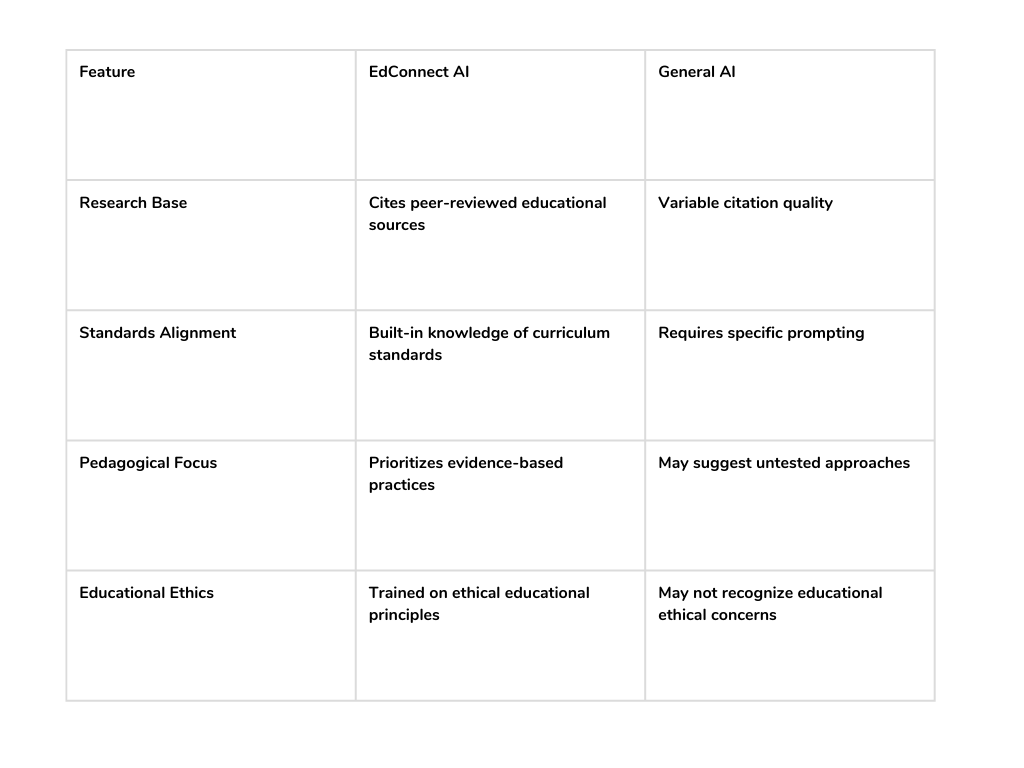Optimizing AI for Educational Excellence
Disclaimer: This article’s research was conducted with the assistance of EdConnect, an optimized Generative A.I for educational research and evolving best practices. To avoid bias toward EdConnect, the comparisons were done by ChatGPT’s GPT-4.5 model with zero editing. © 2025 The Connected Classroom. All rights reserved.
Educational Support Through Specialized AI
Today's educators face unprecedented challenges that require innovative solutions. While general-purpose AI tools like ChatGPT offer broad capabilities, specialized educational AI assistants like EdConnect AI provide targeted support aligned with pedagogical best practices. This comparison explores how purpose-built educational AI delivers superior value for curriculum development, instructional coaching, and technology integration.
Educational Focus: Precision vs. Generalization
EdConnect AI's specialized architecture prioritizes educational expertise across five critical domains:
Curriculum Development : Standards alignment, differentiated instruction, and assessment design
Instructional Coaching : Evidence-based teaching methodologies and engagement strategies
Technology Integration : Pedagogically-sound edtech implementation
Assessment and Rubric Creation : Innovative assessments and rubric creation balanced to standards or competencies.
Research and Citation : Capabilities to reference and cite peer-reviewed educational research
Unlike general AI tools, EdConnect accesses verified educational databases including ERIC, JSTOR, and ISTE, ensuring responses align with current research and best practices.
{Here is a features comparison chart of EdConnect and ChatGPT}
Feature Comparison: Educational Advantages
Research by Holstein et al. (2022) found that "AI tools designed specifically for educational contexts demonstrate significantly higher alignment with established pedagogical frameworks than general-purpose AI systems" (https://www.jstor.org/stable/26985237).
Response Quality: Meeting Educator Needs
EdConnect AI delivers responses that are:
Research-grounded : Every recommendation links to educational research
Actionable : Practical strategies educators can implement immediately
Contextually appropriate : Solutions tailored to specific educational settings
Below is an analysis of the prompt [Create a differentiated lesson plan for teaching photosynthesis to 7th graders] ChatGPT compared the two outputs in the unedited analysis. You can view both lesson plans by clicking on the link.
Avoiding AI Pitfalls in Education
Recent research by Dede & Richards (2020) highlights significant concerns with general AI tools in education, including algorithmic bias, factual inaccuracies, and lack of pedagogical foundation (https://eric.ed.gov/?id=EJ1257367).
EdConnect AI addresses these challenges through:
Educational database verification
Pedagogical framework alignment
Mandatory source citation
Focus on evidence-based practices
Practical Applications
Educators report most value from specialized AI in:
Developing differentiated assessment strategies
Creating standards-aligned curriculum maps
Identifying evidence-based intervention approaches
Integrating technology meaningfully into instruction
Conclusion: The Future of AI in Education
While general AI tools offer convenience, specialized educational AI provides the precision, research foundation, and pedagogical expertise educators need. As Reich (2023) notes, "The most valuable AI tools for education will be those designed specifically to support evidence-based teaching and learning practices" (https://www.researchgate.net/publication/374586291).
By choosing purpose-built educational AI like EdConnect, educators gain a partner that understands their unique challenges and delivers solutions grounded in educational research and best practices.
Disclaimer: This article’s research was conducted with the assistance of EdConnect, an optimized Generative A.I for educational research and evolving best practices. To avoid bias toward EdConnect, the comparisons were done by ChatGPT’s GPT-4.5 model. © 2025 The Connected Classroom. All rights reserved.
